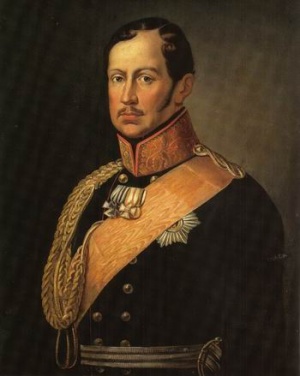Difference between revisions of "Friedrich Wilhelm III, King of Prussia (1770-1840)"
| [checked revision] | [checked revision] |
m |
m (Text replace - "<em>Mennonitisches Lexikon</em>, 4 vols. Frankfurt & Weierhof: Hege; Karlsruhe: Schneider, 1913-1967: v. II," to "''Mennonitisches Lexikon'', 4 vols. Frankfurt & Weierhof: Hege; Karlsruhe: Schneider, 1913-1967: v. II,") |
||
| Line 7: | Line 7: | ||
Friedrich Wilhelm died 7 June 1840 and was succeeded by his eldest son [[Friedrich Wilhelm IV, King of Prussia (1795-1861)|Friedrich Wilhelm IV]]. | Friedrich Wilhelm died 7 June 1840 and was succeeded by his eldest son [[Friedrich Wilhelm IV, King of Prussia (1795-1861)|Friedrich Wilhelm IV]]. | ||
= Bibliography = | = Bibliography = | ||
| − | Hege, Christian and Christian Neff. | + | Hege, Christian and Christian Neff. ''Mennonitisches Lexikon'', 4 vols. Frankfurt & Weierhof: Hege; Karlsruhe: Schneider, 1913-1967: v. II, 4. |
Mannhardt, W. <em>Die Wehrfreiheit der Altpreussischen Mennoniten</em>. Marienburg, 1863. | Mannhardt, W. <em>Die Wehrfreiheit der Altpreussischen Mennoniten</em>. Marienburg, 1863. | ||
Latest revision as of 00:25, 16 January 2017
Friedrich Wilhelm III (Frederick William), King of Prussia (König von Preußen), 1797-1840, was born 3 August 1770, the eldest son of Friedrich Wilhelm II and Friederike Luise of Hesse-Darmstadt (1751-1805). He succeeded his father as king in 1797.
Friedrich Wilhelm III was one of the most peaceable of the rulers of Prussia, and for that reason friendly toward the Mennonites. But under his reign Prussia became involved in the most serious wars. Hence the Mennonites of Prussia not only shared the suffering of the entire country, but also had to struggle to preserve their nonresistance. More than once when this principle was threatened the king personally defended them. Nor did he overlook their voluntary offer of money and provisions to the utmost of their capacity, as well as their service in nursing care. In 1827 he issued the special law of 11 March, legally freeing the Mennonites from the obligation to swear an oath.
Friedrich Wilhelm died 7 June 1840 and was succeeded by his eldest son Friedrich Wilhelm IV.
Bibliography
Hege, Christian and Christian Neff. Mennonitisches Lexikon, 4 vols. Frankfurt & Weierhof: Hege; Karlsruhe: Schneider, 1913-1967: v. II, 4.
Mannhardt, W. Die Wehrfreiheit der Altpreussischen Mennoniten. Marienburg, 1863.
| Author(s) | H. G. Mannhardt |
|---|---|
| Richard D. Thiessen | |
| Date Published | April 2007 |
Cite This Article
MLA style
Mannhardt, H. G. and Richard D. Thiessen. "Friedrich Wilhelm III, King of Prussia (1770-1840)." Global Anabaptist Mennonite Encyclopedia Online. April 2007. Web. 16 Apr 2024. https://gameo.org/index.php?title=Friedrich_Wilhelm_III,_King_of_Prussia_(1770-1840)&oldid=145181.
APA style
Mannhardt, H. G. and Richard D. Thiessen. (April 2007). Friedrich Wilhelm III, King of Prussia (1770-1840). Global Anabaptist Mennonite Encyclopedia Online. Retrieved 16 April 2024, from https://gameo.org/index.php?title=Friedrich_Wilhelm_III,_King_of_Prussia_(1770-1840)&oldid=145181.
Adapted by permission of Herald Press, Harrisonburg, Virginia, from Mennonite Encyclopedia, Vol. 2, p. 386. All rights reserved.
©1996-2024 by the Global Anabaptist Mennonite Encyclopedia Online. All rights reserved.

